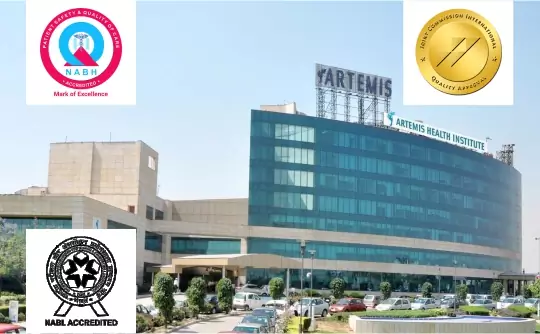

Hip Replacement Surgery Cost in India starts from US $5,500 for a single hip and $9,900 for both hips and varies with the type of implant, technique of surgery, your medical condition, surgeon, facility and the city where you choose to get the surgery done.
An important expense when it comes to your Hip Replacement cost in India is going to be your orthopedic surgeon's fees. IndiCure recommends only experienced, skilled, board-certified surgeons who are capable of delivering successful orthopedic surgeries. Although, the charges may vary depending on the experience of the surgeon.
A significant portion of the overall cost of a Hip Replacement arises from the cost of the Implant. This includes the material the implant is made up of. The other factor is the use of any customized surgical instruments or specialized computer technology. With the hopes of improving patient care, new techniques and technologies are often introduced to the surgical process. Such innovative advancements in the surgical approach can increase costs.
Having your Hip Replacement in an accredited surgical facility by skilled and qualified medical staff is a critical factor. Moreover, the geographical location of this facility also affects the quote. But, IndiCure provides you with a projected estimate that will be all inclusive and affordable.
The surgery-related expenses include the pre- and post-surgical expenses. The pre-surgical expenses are associated with the candidacy and the medical history of the patient. This also includes the routine medical exams and tests to ensure you're a good fit for the surgery. Post-surgical expenses can include prescription medications, physical therapy, rehabilitation stay, and follow-up consultations.
We at IndiCure, understand that you travel with a budget in mind and do not like to be greeted by surprises after arrival in India. We thus club all these expenses and give you the package cost that is inclusive and affordable at the same time.
Your case manager shall give you an estimated cost of your surgery after discussing your medical reports with the surgeon. The final cost, however, shall be confirmed after your consultation with the surgeon.

We Help you Choose the Right Treatment, Surgeon & Hospital

We Arrange Video/Telephonic Consultation with the Surgeon

We Assist you with Visa & Accommodation

We Receive you at the Airport and Drop you at Hotel/Hospital

We Assist you the at Hospital & Provide Post Operative Support
In fact, we have Special Negotiated Rates with the Hospitals and you can avail Discounted Rates when you choose to Travel with IndiCure.


WockHardt Hospital
Mumbai
Wockhardt Hospitals is the branch of the leading Wockhardt pharmaceutical company in India. The company is more than four decades old and is present in more than 20 countries around the globe. Wockhardt has 9 hospitals in India in Mumbai, Nagpur, Rajkot, Nashik, and Surat.

Artemis Hospital
Gurgaon
Artemis Health Institute, a premium multi-specialty hospital is a healthcare venture launched by the promoters of the Apollo Tyres Group. Established in 2007, Artemis was the first hospital in Haryana to get NABH accreditation within 3 years of start-up.
Everyday tasks such as walking or getting in and out of a chair may be uncomfortable and difficult if your hip has been injured by arthritis, a fracture, or other disorders. It's possible that your hip is stiff, making it difficult to put on shoes and socks. You might even feel uneasy while sleeping.
The diseased bone and cartilage are removed and replaced with prosthetic components in a hip replacement (also known as total hip arthroplasty or total hip replacement).
The injured femoral head is removed, and a metal stem is inserted into the hollow middle of the femur to replace it. In the bone, the femoral stem can be cemented or "pressed fit."
You, your family, your primary care physician, and your orthopedic surgeon should all work together to make the choice to have hip replacement surgery. Your doctor may prescribe hip replacement surgery for a variety of reasons few of which include:
There are no age or weight restrictions in being a candidate for hip replacement surgery. Surgery is recommended based on a patient's discomfort and handicap, not their age. The majority of patients who have a total hip replacement are between the ages of 50 and 80, although orthopedic surgeons assess each patient individually. Hip replacements have been successfully performed on patients of all ages, from teenagers with juvenile arthritis to the elderly with degenerative arthritis.
The surgery is usually performed under general anesthesia and takes two hours.
An incision is made on the lateral side of the hip. The upper round part of the thigh bone (head of the femur) is removed and replaced with an implant.
It is then stabilized into place by cementing or other methods. The part of the hip joint receiving the ball component called a socket or acetabulum is smoothened and prepared, and the implant is then placed to position and stabilized.
The new ball and socket of the joint are then joined.
The healing process for a hip replacement begins straight away. After surgery, you will be encouraged to get up and move around as soon as possible. You'll be taken to a recovery area for a few hours after surgery when your anesthetic wears off. Your blood pressure, pulse, awareness, pain or comfort level, and medication needs will all be monitored by medical personnel.
The length of your stay after surgery is determined by your specific needs. The stay at the hospital ranges from 3-5 days. To help keep fluid out of your lungs, you'll be asked to take deep breaths, cough, or blow into a device.
Physical therapy will start the next day and shall be required for several weeks after surgery. This will help you rebuild muscular strength and range of motion. When you are ready to walk with or without help, the surgeon, physical therapist, or occupational therapist can advise you on how to manage your discomfort. Your rehabilitation needs will be discussed, as well as what to expect in the days and weeks ahead and how to make the most of your recuperation. Your motivation and participation in completing physical therapy is important to a successful recovery and overall surgery outcome.
Expect your replaced hip joint to relieve the pain you were experiencing prior to surgery and expand your joint's range of motion. But don't expect to be able to accomplish everything you could before the hip discomfort had set in.
High-impact activities, such as jogging or basketball, may put your artificial joint under too much stress. However, with time, you may be able to swim, golf, hike, or ride a bike without difficulty.
Hip replacement surgery has a success rate of more than 90%.
We at IndiCure completely understand your concerns and it is always our endeavor to provide the best outcome for every patient. Following is the list of questions you must ask before you embark on your journey for Hip Replacement surgery in India.
Prepare to answer questions about your:

Hip replacement surgery cost in India starts from US $5500 and varies depending upon the type of implant, whether you need total or partial (hip ball replacement surgery), type of implant, your medical condition, surgeon, facility and the city where you choose to get the treatment done. Various factors affecting the cost are listed above.
There is absolutely no catch. The cost of hip replacement surgery in India and for that matter, medical treatment in India is much less because of the following reasons:
Low cost of endowment in India - Qualified doctors, surgeons, nursing staff, lower investments costs, subsidies by government to private healthcare sector are more as compared to other countries.
An exchange rate regime, which is favorable to India (indicative rates only, may not be currently applicable)
1 USD= 75 Indian rupees
1 GBP= 100 Indian rupees
1 Euro= 85 Indian rupees
The first step is to send us your medical history, X-ray and other medical reports for the surgeon's evaluation. You can send these details to info@indicure.com . You would be assigned a case manager who shall get back to you with the surgeon's opinion, cost and other necessary details. For more information, please visit our Step-by-step guide
Your case manager would share the surgeon's opinion as is, his or her detailed profile, details about the hospital where your surgery shall be done, type of implant and other necessary details. You can also choose to speak with the surgeon over phone or have a video consultation with the surgeon. We make sure you get the best quality treatment and best possible results for your surgery in India. To answer more on Medical Tourism related questions read our General FAQs sections.
The success rate of hip replacement surgery in India is as good as the best in the world. More than 95 percent of patients report relief from hip discomfort. Hip replacements have a success rate of 90-95 percent after ten years and 80-85 percent after twenty years world-wide and same for India.
If other therapies, such as pain medications, exercises, physiotherapy have failed, hip replacement is usually the answer. If you experience severe pain, loss of motion or deformity of the hip joint, it is better to get hip replacement surgery done. Hip replacement surgery is also done in people suffering from rheumatoid arthritis, some form of hip injuries, bone tumor or bone loss due to insufficient blood supply, which is medically known as avascular necrosis of the hip joint.
If for some reason you are not a candidate for hip replacement surgery, or do not wish to undergo hip replacement, there are effective non-conventional treatment options for you to get relief from your hip pain- Ayurveda treatment.
Ayurveda is an ancient Indian medical practice that dates back over 3,000 years. Internal cleansing is the first step in Ayurveda treatment, followed by a particular diet, herbal treatments, massage therapy, yoga, and meditation. There are various Ayurveda treatment options available to completely cure hip pain. Talk to your case manager and he/she shall be able to help you.
There is no right or ideal age to get the hip replacement done. If you cannot bear pain any more and the other options are not working, you can get your hip replaced irrespective of your age. The average age of hip joint replacement patients is around 60 years old; however, patients of all ages have received hip implants.
THR used to be an option mainly for adults after 60. But improvements in technology have made implants or artificial joints that last for life. Besides these implants allow young people to lead an active life even after hip replacement.
According to studies, the majority of patients who have hip replacement surgery are between the ages of 50 and 80. Even if you're not in that age range, a hip replacement can be a safe and life-changing procedure for persons as young as 18 and as old as 90. The most important thing is that the patient is in good physical condition. The ideal patient is physically fit and has good cardiovascular health.
You should expect some pain in the hip area, as well as groin and thigh soreness. This is normal while your body adjusts to the alterations in the area's joints. Your surgeon shall prescribe you pain medications to help you manage the pain and discomfort.
Depending on your progress and the type of surgery you have, you'll normally remain in the hospital for 3 to 5 days. If you're in good health, the surgeon may recommend an enhanced recovery programme, in which you begin walking on the day of surgery and are discharged in one to three days.
Most hip replacement patients walk the same day or the following day after surgery, and most can return to their typical routine activities within the first 3 to 6 weeks of the procedure. It's critical to add healthy exercise into your recovery regimen once mild activity is permitted.
You can return to work in about two weeks if you have a desk job with little movement. It is recommended that you take around six weeks off if your employment includes heavy lifting or is particularly taxing on the hips.
Inactivity can result in a loss of muscular strength and increased hip joint stiffness. Weak hip muscles and joint stiffness might cause a noticeable limp if you don't get a hip replacement. Delay in hip replacement might cause significant muscle loss, which can lead to a prolonged recovery time.
Walking is the ideal workout for a successful recovery because it allows you to regain hip mobility. Using a walker or crutches at first will help prevent blood clots and develop your muscles, allowing you to move your hips more freely.
Most things will return to normal three months following your hip operation, and the pain will have subsided for most people. You should keep an eye out for indicators of problems and continue to move your hip with caution. The healing is deemed complete after 6 to 12 months.
Hip replacement is a fairly successful surgery with very little chances of risks or complications. However, following are the risks associated with hip replacement.
Blood Clots: After surgery, clots can form in your leg veins. Because a portion of a clot can break off and move to your lung, heart, or, in rare cases, your brain, this can be dangerous. To lessen this risk, your doctor may prescribe blood-thinning drugs.
Infection. Infections can arise near your replacement hip, as well as at the location of your incision. Antibiotics heal most infections, but a serious infection near your prosthesis may necessitate surgery to remove and replace the prosthetic.
Fracture. Healthy parts of your hip joint may fracture during surgery. Fractures that are minor enough to heal on their own are sometimes possible, while bigger fractures may require the use of wires, screws, and possibly a metal plate or bone.
Dislocation. The ball of your replacement joint might come out of the socket in certain postures, especially in the first few months after surgery. If your hip dislocates, your doctor may prescribe a brace to retain it in the proper position. If your hip continues to dislocate, surgery may be necessary to stabilize it.
Changes in leg length. Although your surgeon takes precautions to avoid the issue, it is possible that a new hip will cause one leg to be longer or shorter than the other. A contracture of the muscles around the hip can sometimes cause this. In this situation, strengthening and stretching certain muscles over time may be beneficial. After a few months, small changes in leg length are unlikely to be seen.
Loosening. Although this is a rare issue with newer implants, your replacement joint may not be firmly attached to your bone or may loosen over time, producing hip pain. Surgery may be required to correct the condition.
Damage to the nerves. Nerves in the location where the implant is put can be harmed on rare occasions. Numbness, weakness, and discomfort are all symptoms of nerve injury.
A careful surgical technique, the use of a pneumatic tourniquet, hypotensive anesthesia, proper patient placement, and maintaining the patient's body temperature throughout surgery all help to reduce blood loss.
Yes, both hips can be replaced during a single operation, and the procedure for replacing both hips during a single surgery is called bilateral hip replacement. If you have problems with both hips and are in good health, your doctor may recommend a double hip replacement, provided you can handle a lengthier surgery and a more difficult recovery.
You would be advised to lie on your back for around 6 to weeks of the surgery depending on your recovery. Lying on your back with a pillow between your legs is the ideal sleeping posture for your hip.
The hip is a considerably more straightforward joint. The knee must balance and shift side to side in order to balance off-center loads. You're also losing a lot of tissue and bone with a total knee replacement. Knee surgery causes more postoperative discomfort because the soft tissue that is impacted by the procedure must stretch more than soft tissue surrounding the hip.
Ceramic hip replacements are preferred to metal or plastic hip replacements, according to research, because ceramic is more durable and may last longer. Ceramic materials have some drawbacks, such as the danger of breakage during implant. Fractures are less of a concern today because of advancements in modern materials.
Yes. For around a month after the surgery, when you first come down, you'll lead with your operated leg. You will be able to perform stairs in a more typical manner as your muscles become stronger and your mobility improves.
Make your medical trip to India even more comfortable and complete with our range of additional services, designed to take care of all your needs beyond the hospital.
Traveling abroad for medical reasons can be challenging if you are alone, but with IndiCure by your side, it doesn't have to be. With over fifteen years of experience and an exclusively curated network of India's best surgeons and top hospitals, we make your medical tour to India easier and safer. We will guide you at every step, handling all the end-to-end arrangements for your surgery, travel, and stay.
Ramandeep Dhaliwal
a month ago
I had great experience having rhinoplasty through Indicure. Dr. Ruchika from Indicure has helped me in finding best plastic surgeon, answering all my questions...
Ramandeep Dhaliwal's Full Review
Joshua Archer
3 months ago
My name is Joshua Archer I'm from New Zealand, bay of plenty, kawerau I opted for the bypass surgery in January 2023 but planned it in advance for 28 September found IndiCure...
Joshua Archer's Full Review
Kera Ren
8 months ago
Absolutely loved my experience with IndiCure - from first inquiring to meeting the surgeon pre op to my follow up post op. The surgeon was extremely approachable...
Kera Ren's Full Review
Andreana Paul
5 months ago
Had a wonderful experience. Visited India for my plastic surgery. From sending mails, airport pickup, comfortable accommodation and, to smooth hospital appointment booking...
Andreana Paul's Full Review
Brandi Luce
5 months ago
I had the privilege of using Indicure's services for a cosmetic procedure that I had wanted for a long time but had always been apprehensive about. Ruchika helped me...
Brandi Luce's Full Review
Jade M
3 years ago
Indicure Health Tours went above and beyond my expectations. They helped me with every aspect of my journey and were professional, kind and caring. I was...
Jade M's Full Review
The content on the website (www.indicure.com) is intended to be general information and is provided only as a service. All photographs on our website of before and after results are examples only, and do not constitute an implied or any other kind of certainty for the result of surgery.
Learn about IndiCure Health Tours' comprehensive editorial policy that strives to deliver trustworthy, helpful, relevant, accurate and people-first content on medical tourism in India.
It is not medical advice and should not be taken as medical advice. It should not be used to diagnose or treat a health condition and is in no way meant to be a substitute for professional medical care. You are advised to see a surgeon in person to assess what surgery may or may not accomplish for you.
It is also important to keep your expectations realistic and to understand that all surgical procedures carry risks and should never be taken lightly.